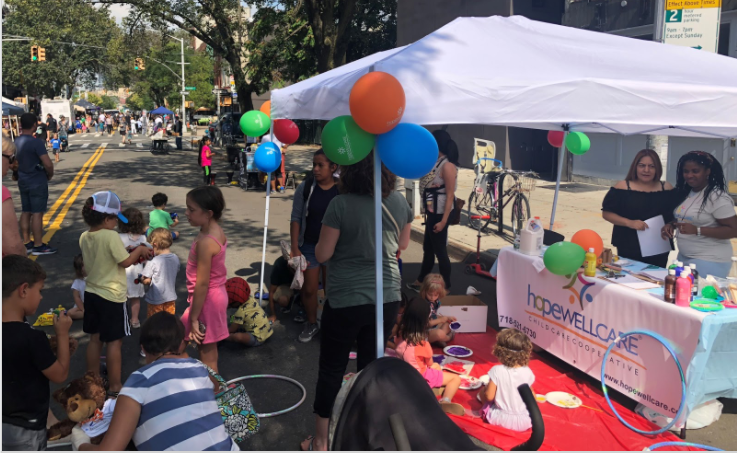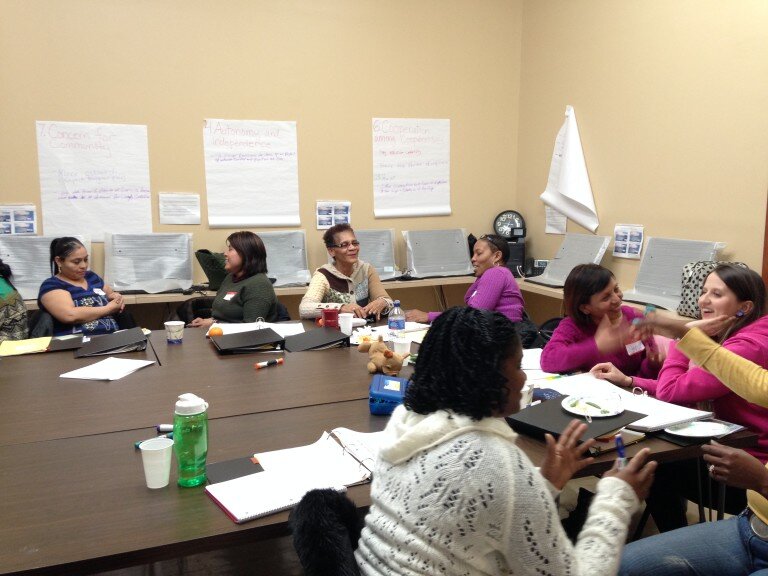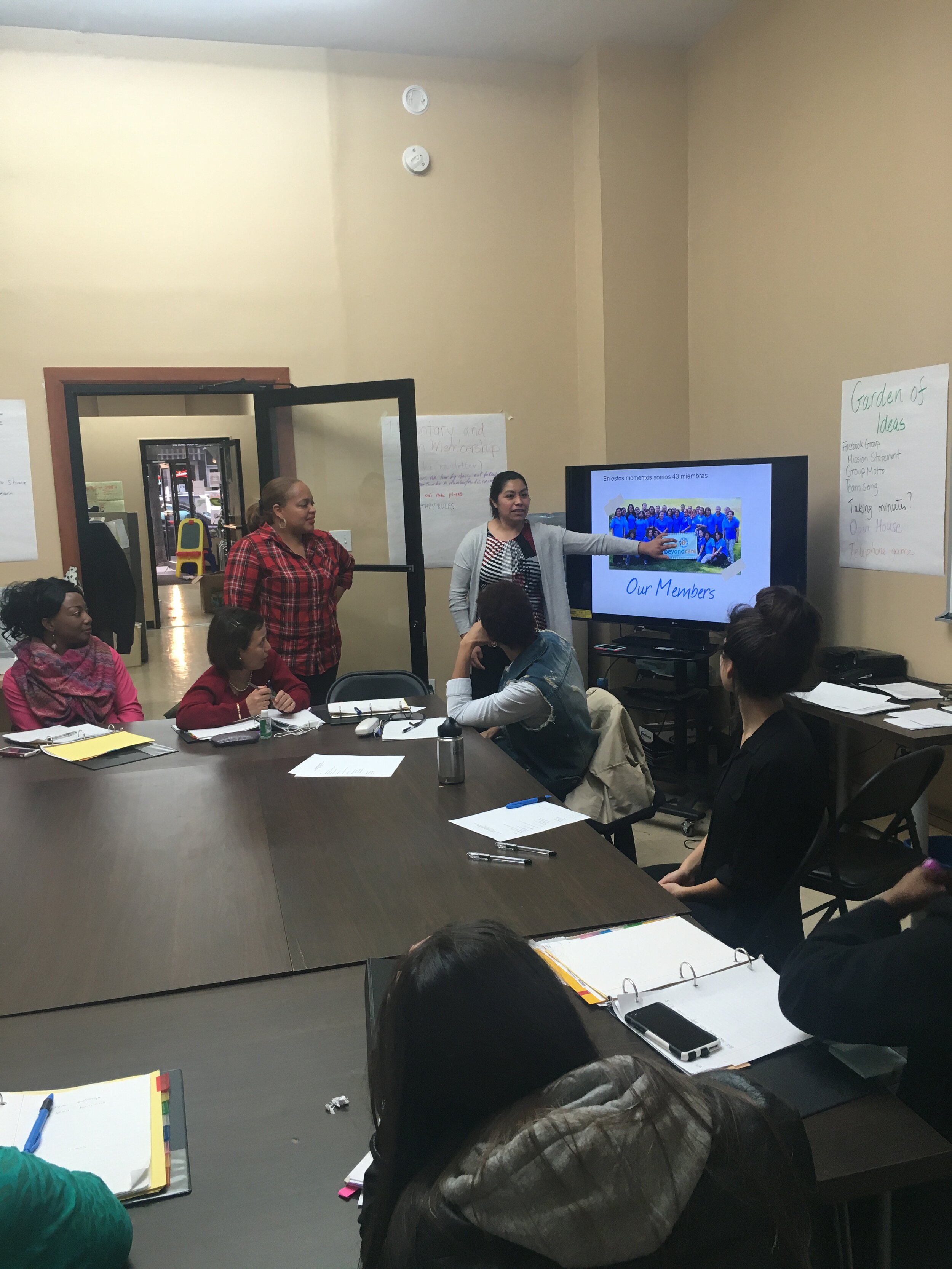
Hopewell Care Childcare Worker Cooperative
As part of our commitment to cooperative economics and domestic worker organizing we provide ongoing support to Hopewell Care, an immigrant and women owned childcare cooperative established in 2018. In 2017 we condcuted outreach and info sessions assessing interest in the project, ultimately recruiting the members that would become the founders and current worker owners. Continue below to learn more in detail about the incubation process. If you are looking to hire or learn more about Hopewell Care’s services you can learn more at their website.
The 11 week training includes a range of topics, where members will learn about cooperative principles such as worker ownership and democratic decision-making and build the technical skills necessary to start their own worker co-op business. They will also have the opportunity to learn about the broader worker cooperative movement and how this business model supports domestic worker rights’, develops sustainable wage jobs, and empowers minority and immigrant women. Various guest speakers will be presenting throughout the training sessions, such as the National Domestic Workers Alliance and The Working World.
We feel incredibly lucky and inspired to see such a strong, diverse group of women come together to embark on this exciting journey. Coming from all over the Caribbean, Mexico, Ecuador, Brazil, and Nepal, and currently living in neighborhoods across Brooklyn and Queens, each woman brings a unique experience and perspective that we are excited to learn from and build upon.
Nanny Training With Cornell University Cooperative Extension School. Members participated in a two part training that covered child nutrition, health and safety, child developmental psychology, and first aid and CPR certification.
Connecting with the Cooperative Movement and Domestic Worker Movement. Members participated in the National Domestic Workers Alliance’s International Domestic Worker Day celebration!
End of Training Celebration! A much deserved celebration and acknowledgement of the commitment members showed throughout the training.
Despite not being officially launched, the coop was one of 20 cooperatives selected to participate in the City Council Cooperative Business Fair!
Week 1: Introduction to Worker Co-ops and Co-op Principles
The first session focused on building connections among members and introducing the seven principles of cooperatives. Members walked around the room to reflect on how these principles will guide the cooperative as it develops.
Week 2: Communication and Team Building
This week focused on how effective communication can support the cooperative and members in their own lives. We practiced active listening and decision making to set the foundation for group accountability, clear communication, and trust.
Week 3: Knowing Your Rights as a Domestic Worker
The third session focused on connecting the worker cooperative model to the broader movement for domestic workers and immigrant rights. We were fortunate to have the inspiring Irene Jor from the National Domestic Workers Alliance facilitate the meeting as a guest speaker. Irene highlighted how by joining a cooperative, the nannies are becoming agents of change and shifting dynamics in the domestic worker industry.
After discussing how the origins of domestic work in the US are rooted in the institution of slavery, Irene explained the landmark policy changes and laws that have been fought and won over the years by workers thanks to organizing. The nannies had the opportunity to share current injustices they face, and what could be changed in their contract to ensure dignity in the workplace. They also reflected on what changes and actions could be taken at different levels (individual, cooperative, community, institutional, and cultural) to advance worker justice. We ended the session with a powerful closing, and are already looking forward to next week’s workshop.
Week 4: The Childcare Industry Part I: Beyond Care
Three guest speakers from the Sunset Park-based childcare cooperative Beyond Care presented at our fourth training session. They discussed the challenges of getting their cooperative off the ground, but also how rewarding the experience has been. Starting a cooperative requires patience, and this multi-year process can be a source of frustration. But the hard work pays off – Beyond Care started with 17 founding members in 2008 – all immigrant women – and has expanded to 43 members today! They offer a range of services, from full-time nannies to last-minute babysitters.
Some of the major benefits of being part of a co-op include personal growth through professional development opportunities (ex: nutrition training, child psychology), dignified work through contracts that set clear boundaries and benefits (sick days, paid vacation), education regarding domestic workers’ rights, and all around greater respect from their employers. The Carroll Gardens nannies had the opportunity to ask Beyond Care many questions and to learn from their concrete experience. We are lucky to have them as a resource in the community and in the worker cooperative movement!
Week 5: The Childcare Industry Part II: The Employer’s Perspective
This week focused on the employer’s perspective in the childcare industry – what do parents look for when hiring a nanny? How do you build a trusting relationship and good rapport with the family? What are some do’s and don’ts? The group received advice from Sharon Tepper, former advisor for CareTango, as well as nanny wisdom from a panel of highly experienced childcare workers. Nannies learned about a range of topics, from best practices for communicating with families to developing a neighborhood network to socialize children.
After discussing the importance of body language, appearance, and active listening skills during job interviews, we did a round of mock interviews and role plays to practice responding to common parent questions. All in all, a highly instructive session!
Week 6: Business Planning Part I: Business Model Canvas
This week the group of nannies came up with their own business model, using a tool known as the “Business Model Canvas.” Some questions they asked themselves: What unique value do we bring to our customers? To our members? To our community? Who are our key customers and what kind of relationships would we like to build with them? What is our marketing strategy? Who are our key partners and resources?
The women broke down into three groups to tackle different aspects of business model planning, before reporting back to the group as a whole and presenting their ideas. Next week, we will be covering the financial aspects of business planning. We’re excited to see the cooperative idea form into a tangible, concrete work in progress!
Week 7: Business Planning Part II: Business Financials
This week the Childcare Worker Co-op nannies learned about Business Financials! Amazing guest speakers from The Working World came and demystified profit margins, fixed costs, variable costs, sale volumes, and other intimidating financial concepts. Thankful for this highly informative session and for moving forward with the co-op incubation!
Week 8: Decision Making
This week guest speaker Rachel from Sunset Park’s Center for Family Life came to talk about different ways to make decisions as a group. Spontaneous decisions, negotiation, multiple voting, majority voting, consensus… What is right for your co-op? We discussed how different types of decisions call for different methods – while some situations need quick, time-efficient decisions, long-term decisions that deeply affect the co-op and its members require maximum democratic participation and agreement.
After walking us through the process of reaching an agreement through consensus, Rachel got the nannies to practice through a fun round of mock consensus-building and role plays.
Week 9: Management and Governance
Building off of last week’s discussion on Decision-Making, this week focused on the difference between “Governance” and “Management.” Should only a handful of members be at the table when making a decision that could have long-lasting, deep effects on all the members? Should all members reach a consensus when working out specific logistics for an outreach event?
Through a fun activity, the nannies started thinking about in what cases should ALL members be involved in making a decision, versus the cases in which delegating a decision to a committee might be more time-efficient. Gale & Nat also described their experience representing the cooperative at NYC’s Co-op Fair!
Week 10: Marketing & Name Brand Development
This week, members from the Red Hook-based cooperative Kaluk came to speak about marketing strategies and choosing a name for the cooperative. Nannies voted on the coop’s core values that should be conveyed through their brand, and got to practice their marketing skills through phone calls. It was a session packed with fun activities thanks to Kaluk’s young, energetic team and the increasingly outspoken nannies!























